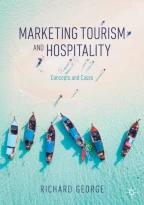Tourism and Hospitality Marketing Principles

This chapter explores some of the key issues and principles of tourism and hospitality marketing. The terms “tourism” and “hospitality” are defined and then the concepts of marketing and tourism marketing are examined. The chapter discusses how marketing applies to the field of tourism and hospitality. It also described the core principles of marketing. These include information gathering, the marketing mix, marketing planning, and customer relationship management. Further, this chapter presents some of the reasons for studying tourism and hospitality marketing. Finally, the chapter’s in-depth case study examines the concept of marketing orientation and its application to Warner Bros Studio Tour, London: The Making of Harry Pot ter.
This is a preview of subscription content, log in via an institution to check access.
Access this chapter
Subscribe and save
Springer+ Basic
€32.70 /Month
- Get 10 units per month
- Download Article/Chapter or eBook
- 1 Unit = 1 Article or 1 Chapter
- Cancel anytime
Buy Now
Price includes VAT (France)
eBook EUR 42.79 Price includes VAT (France)
Softcover Book EUR 52.74 Price includes VAT (France)
Tax calculation will be finalised at checkout
Purchases are for personal use only
References
- Booms, B., & Bitner, M. (1981). Marketing strategies and organisation structures for service firms. In J. Donnelly & W. George (Eds.), Marketing of services (p. 48). Chicago: AMA Proceedings Series. Google Scholar
- British Hospitality Association (BHA). (2020). About. Retrieved from https://www.ukhospitality.org.uk/page/About. (12 Oct 2020).
- Carroll, A., & Buchholtz, A. (2003). Business and society: Ethics and stakeholder management (5th ed.). Australia: Thomson South-Western. Google Scholar
- Drucker, P. F. (1969). The practice of management. London: Heinemann. Google Scholar
- Enright, M. (2002). Marketing and conflicting states for its emergence: Hotchkiss, Bartels and the fifties school of alternative accounts. Journal of Marketing Management, 18, 445–461. ArticleGoogle Scholar
- Expedia. (2018). American vacation deprivation levels at a five-year high. Retrieved from https://newsroom.expedia.com/2018-10-16-American-vacation-deprivation-levels-at-a-five-year-high#assets_all. (18 Nov 2019).
- Frey, N., & George, R. (2010). Responsible tourism and the tourism industry: A demand and supply perspective. Tourism Management., 31(5), 621–628. ArticleGoogle Scholar
- Goodwin, H., & Francis, J. (2003). Ethical and responsible tourism: Consumer trends in the UK. Journal of Vacation Marketing, 9(3). Google Scholar
- Gummesson, E. (1987). The new marketing: Developing long-term relationships. Long Range Planning, 20(4), 10–20. ArticleGoogle Scholar
- Horner, S., & Swarbrooke, J. (2016). Consumer behaviour in tourism (3rd ed.). Oxford, UK: Butterworth-Heinemann. BookGoogle Scholar
- Kotler, P. (2000). Marketing management: Analysis, planning, implementation and control (10th ed.). London: Prentice Hall. Google Scholar
- Kotler, P., & Armstrong, G. (2019). Principles of marketing (17th ed.). London: Pearson Education. Google Scholar
- Levitt, T. (1960). Marketing myopia. Harvard Business Review. July/August. Google Scholar
- Lipman, G., Jiang, M., Vorster, S., & DeLacy, T. (Eds.). (2014). Green growth and travelism: Concept, policy and practice for sustainable tourism. London: Routledge. Google Scholar
- Lumsdon, L. (1997). Tourism marketing. London: International Thomson Press. Google Scholar
- Mathieson, A., & Wall, G. (1982). Tourism: Economic, physical, and social impacts. New York: Longman. Google Scholar
- McCarthy, E. J. (1960). Basic marketing: A managerial approach. Homewood, IL: Irwin. Google Scholar
- Middleton, V., & Clarke, J. (2001). Marketing in travel and tourism (3rd ed.). Oxford, UK: Butterworth-Heinemann. Google Scholar
- Middleton, V., Fyall, A., Morgan, M., & Ranchhod, A. (2009). Marketing in travel and tourism (4th ed.). Oxford, UK: Butterworth-Heinemann. Google Scholar
- Mill, R. C., & Morrison, A. M. (1992). The tourism system: An introductory text (2nd ed.). London: Prentice Hall. Google Scholar
- Ministry of Commerce & Industry, Government of India. (2019). Retrieved from hotels and restaurants. http://tourism.gov.in/hotels-restaurants. (13 May 2019).
- Perreault, W. D., & McCarthy, E. J. (2006). Essentials of marketing: A global managerial approach (10th ed.). Boston: McGraw-Hill. Google Scholar
- Pike, S. (2018). Tourism marketing for small businesses. Oxford, UK: Goodfellow Publishers. Google Scholar
- Porter, M., & Kramer, M. (2011). Creating shared value. Harvard Business Review, 89(1/2), 62–77. Google Scholar
- Shaw, G., Bailey, A., & Williams, A. (2011). Aspects of service-dominated logic and its implications for tourism management: Examples from the hotel industry. Tourism Management, 32, 207–214. ArticleGoogle Scholar
- Skripak, S. (2018). Fundamental of business (2nd ed.). Virginia, USA: Virginia Tech Libraries. BookGoogle Scholar
- Statista. (2018). Online travel market – Statistics & facts. Retrieved from https://www.statista.com/topics/2704/online-travel-market/. (14 Aug. 2018).
- TripAdvisor. (2020). Warner Bros. Studio tour London – The making of Harry Potter. Available at: https://www.tripadvisor.co.uk/ShowUserReviews-g2691242-d2147749-r129360688-Warner_Bros_Studio_Tour_London_The_Making_of_Harry_Potter-Leavesden_Hertfordshi.html. Accessed 18 Jan 2020.
- United Nations World Tourism Organization. (2008). International Recommendations for Tourism Statistics 2008 (IRTS 2008). Retrieved from http://statistics.unwto.org/en/content/conceptual-framework-tourism-statistics-international-recommendations-tourism-statistics-200. (11 Aug 2018).
- United Nations World Tourism Organization. (2017). Why tourism? Retrieved from http://www2.unwto.org/content/why-tourism. (14 Aug 2018).
- Vargo, S., & Lusch, R. (2004). Evolving to a new dominant logic for marketing. Journal of Marketing, 68(January), 1V17. Google Scholar
- Vinerean, S. (2017). Importance of strategic social media marketing. Journal of Marketing, 5(1), 28–25. Google Scholar
- VisitLondon. (2019). Warner Bros. Studio tour London – The making of Harry Potter. Available at: http://www.visitlondon.com/things-to-do/place/23035130-warner-bros-studio-tour-london-the-making-of-harry-potter#xdOLjgOTIZzmpduA.97. Accessed 18 Jan 2020.
- Xiang, L., & Petrick, J. F. (2008). Tourism marketing in an era of paradigm shift. Journal of Travel Research, 46(3), 235–244. ArticleGoogle Scholar
Further Reading
- Baines, P., Fill, C., Rosengren, S., & Antonetti, P. (2019). Marketing (5th ed.). Oxford, UK: Oxford University Press. Google Scholar
- Kotler, P., & Armstrong, G. (2019). Principles of marketing (17th ed.). London: Pearson Education. Google Scholar

